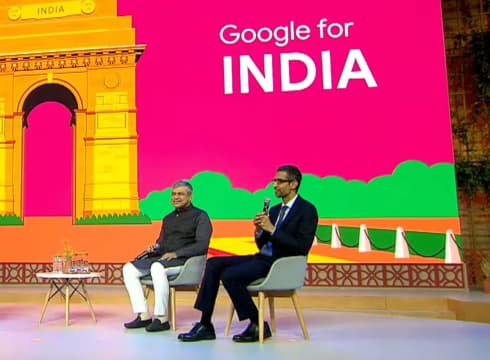The government is creating three horizontals; the Telecom Bill, the Personal Data Protection Bill and the Digital India Bill: Union IT Minister Ashwini Vaishnaw
The draft Telecom Bill and the draft DPDP Bill would be approved by the Parliament by July-August 2023: Vaishnaw
Given the scale at which tech is working, it makes sense for it to have responsible regulation: Google CEO Sundar Pichai
Inc42 Daily Brief
Stay Ahead With Daily News & Analysis on India’s Tech & Startup Economy
Speaking at the Google For India 2022 event, Minister of Electronics and IT, Ashwini Vaishnaw said that the Indian government is working on regulations for the digital economy and the startup ecosystem and the same would be completed in the next 14-16 months.
“With each change in technology, each big quantum jump in the way we live, new challenges come up. We have to find ways by which we create a balanced way of absorbing technology because it brings many new opportunities and challenges with it,” said Vaishnaw. He added that India offers a unique scenario for policymakers as the information is ubiquitous, the data prices are low and the technology adoption is rapid.
“In this kind of scenario, how do we create a legal and regulatory framework which is in tune with times, which matches India’s needs and is built around our realities?” Vaishnaw said at Google For India 2022.
According to the union minister, the government is creating three horizontals for the digital regulatory framework. The first is the draft Telecommunications Bill, the second is the draft Digital Personal Data Protection Bill and the third is the Digital India Bill, which is still under wraps.
The first bill is for the carrier, the second bill is focused around enforcing citizens’ privacy rights and the third will look at everything else, Vaishnaw said in a conversation with Google and Alphabet CEO Sundar Pichai, who was also present at the event being held in Delhi’s Pragati Maidan.
“These are the three horizontals on top of which will be multiple small, sectoral, focused, modular regulations. It is a very comprehensive outlook and we should be able to complete this exercise in the coming 14-16 months,” Vaishnaw said about the digital regulatory framework.
The telecom, electronics and IT minister added that the draft Telecom Bill and the draft DPDP Bill would be approved by the Parliament by July-August 2023. “All of us are giving a lot of time on consultations, on understanding what the concerns of the people are, so the solution which is emerging is very good. Most people have expressed that this kind of template is needed in economies which are getting digitised.”
Both the bills are set to be tabled in the Lok Sabha, the lower house of the Parliament, during the Budget Session. However, both the bills have had their fair share of controversy, in particular the draft Digital Personal Data Protection Bill.
The draft Bill has been called vague by experts in the industry and several aspects have been called into question, such as the independence of the Data Protection Board, user privacy and the issue of data breaches.
When asked about his opinions on India’s digital economy policy framework, the Google CEO said that given the scale at which tech is working and touching the lives of people around the world, it makes sense for tech to have responsible regulation. Pichai said that Google is engaging constructively with the Indian government over policy matters.
Speaking on the role and influence of India around the world in terms of tech policy, Pichai added, “I think India has a leadership role to play here and it is important to make sure that you are putting in safeguards for people, you are creating an innovative framework that the companies can innovate on top of certainty in the legal framework.”
Pichai also added that he hoped India would become a big export economy and benefit from an open and connected internet.
{{#name}}{{name}}{{/name}}{{^name}}-{{/name}}
{{#description}}{{description}}...{{/description}}{{^description}}-{{/description}}
Note: We at Inc42 take our ethics very seriously. More information about it can be found here.


